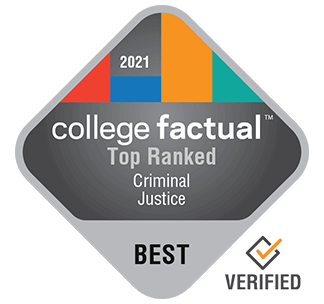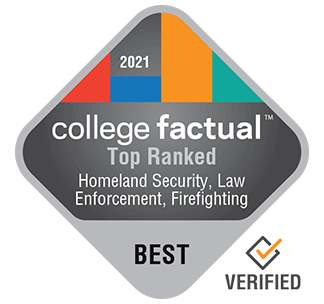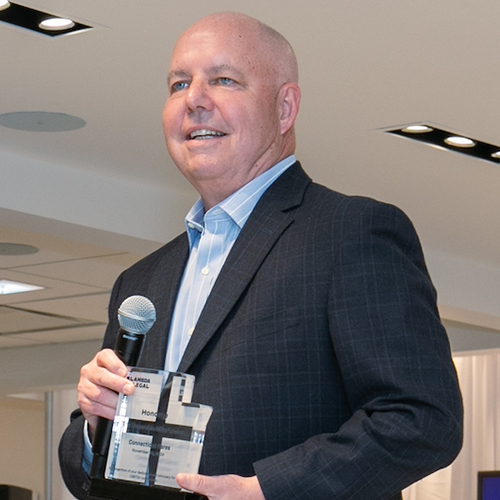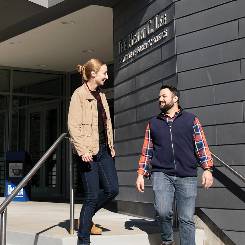
Samantha Villa ’25
Dedicated Criminal Justice Student Recognized for Commitment to Youth Justice Reform
As a criminal justice major at the University of New Haven, you’ll join one of the nation’s most established and diversified criminal justice programs. It’s a program that allows you to customize a major that fuses your interests with pragmatic, sought-after learning opportunities that will lead you to a successful and fulfilling career in this challenging and rewarding field.
You will gain an acute understanding of crime-solving and public safety issues as you learn to not only navigate the intricate fields of criminal justice but also shape the future of our justice system.
Supplement the knowledge you gain in your core criminal justice classes by specializing in an area you are most passionate about.
Prepares students for careers in federal and state community supervision agencies, case management positions in bail and reentry programs, as well as positions in federal, state, and local correctional facilities. Emphasis is on understanding the motivations and drivers of offending and desistance, structural factors, risk assessment, case management, evidence-based supervision, and program evaluation.
Offers students a broad approach and practical skill set for understanding crime patterns, trends, and behavior. Rooted in the fields of criminology, criminal justice, statistics, and data analysis, this concentration provides students with the tools and knowledge necessary to become crime analysts.
Prepares graduates for entry into a wide variety of positions in law enforcement, criminal justice, the courts, corrections, and victim services programs as well as professional settings involving work with victims of crime, their families, and the community at large.
An interdisciplinary program geared toward enhancing the scientific knowledge of those students seeking investigative positions in various enforcement agencies, the curriculum emphasizes law enforcement, evidence, and forensic science.
Prepares service providers with knowledge of law and of social and behavioral sciences, as well as communication skills with children, adolescents, and people of diverse cultural backgrounds.
The curriculum focuses on the roles, activities, and behaviors of people with regard to maintaining law and order, providing needed services, protecting life and property, and planning and research.


College Factual’s data-driven rankings are based on outcomes — such as graduation and retention rates and early and mid-career earnings of graduates — instead of subjective opinions garnered through insider surveys. In addition, all colleges are ranked, not just the top 100.
College Factual has ranked the University of New Haven #1 in the country out of more than 400 colleges and universities offering homeland security, law enforcement, and firefighting majors and #1 in the state and #18 in the country for criminal justice and corrections degrees.
Our faculty are leaders and innovators in their fields, bringing both deep professional experience and academic rigor to the classroom.
Our vision is to be the premier student-centered criminal justice program in the United States, with a national and international reputation for academic excellence, research advancements, and service to the community.
In fulfilling this vision, we seek to:
Our mission is to provide comprehensive and rigorous educational opportunities to inspired students who are taught and mentored by talented and dedicated faculty. In fulfilling this mission, we strive to create and maintain:

Dedicated Criminal Justice Student Recognized for Commitment to Youth Justice Reform

Uses Hatfield Scholarship to Pursue Crime Prevention and Federal Law Enforcement Career

Longtime Professor, Advocate Receives Prestigious Award for Work on Behalf of LGBTQ+ Community
The information below is designed to show the many possible careers you could pursue with your major. The research is provided by Encoura, the leading research and advisory firm focused exclusively on higher education. It includes median national salaries and industry growth projections over the next decade. Click here to view the full report.
First-Line Supervisor
6% Growth 2017-2027
Police Officer
6% Growth 2017-2027
Claims Adjuster
6% Growth 2017-2027
This course explores the changing role, perspectives, and operational strategies of policing as they relate to the crime control function of the police. The focus will be on innovative, promising, emerging, or "futuristic" and often highly controversial police practices, programs, and approaches to law enforcement. In addition, the course will focus on selective community crime prevention efforts undertaken in conjunction with, under the auspices of, or independently of the police department. Special attention will be devoted to police brutality and the use of deadly force and its consequences, including high-speed police pursuits.
In this advanced course, students will focus on the history, philosophy, evolution, and types of white-collar crimes. This course will examine the various types of white-collar offenses and explore how and why such crimes are committed. The course will also explore the various laws used to combat such offenses and consider the investigative techniques used to identify those engaged in such activity. In addition, the course will explore the profile of the modern white-collar offender and the roles of the various federal law enforcement agencies responsible for investigating white-collar crime.
This course is designed to familiarize students with the concept of homeland security from administrative, organizational, historical, and critical perspectives. The course will be taught in a critical-thinking context rather than a training context. Specific emphasis will be placed on homeland security as a public safety paradigm and the implications of this paradigm on government agencies at the state and local level, overall national security, and public perception/opinion. A key component of this course is the presentation, analysis, and discussion of critical issues in homeland security. This is also an advanced course designed to familiarize students with the history and evolution of terrorism, the key concepts and theories of terrorism, the roles and responsibilities of counterterrorism agencies in the U.S., and the critical issues and controversies of the current "War on Terrorism."
This course is an in-depth study of the principles and techniques associated with investigating homicides, suicides, and accidental, natural, or equivocal deaths. While considering the sociological, psychological, and legal aspects typically found in these cases, the process will take the student from the scene to the court – either criminal or civil.
The University of New Haven offers a wide variety of in-depth courses that create a transformational educational experience for our students. To view the complete list of courses you'll take while pursuing a Associate in Science, Bachelor of Science, or Certificate in Criminal Justice, check out the Academic Catalog:
Criminal Justice, B.S. - Crime Data Analytics and Visualization Concentration
Criminal Justice, B.S. - Crime Victim Services Concentration
Criminal Justice, B.S. - Criminology, Corrections, and the Community Concentration
Criminal Justice, B.S. - Investigative Services Concentration
Criminal Justice, B.S. - Juvenile Justice and Delinquency Prevention Concentration
Criminal Justice, B.S. - Police Science Concentration
Double Major - Criminal Justice and Legal Studies, B.S.
Double Major - Criminal Justice and National Security, B.S.
Get an inside look at what differentiates the University of New Haven and how your experiences as a student will prepare you for success.




All University of New Haven students have access to the many resources available through the University’s Career Development Center, which has been named one of the best in the nation by The Princeton Review.
From career assessments, networking, and job shadowing to on-campus interviews and salary negotiation, the Career Development Center provides the skills and connections to identify a meaningful career and an opportunity to pursue your passion.
Learn MoreWhether you're still in high school or are transferring from another college, we offer full- and part-time opportunities for undergraduates from inside the U.S. and abroad. The admission process can begin as early as the end of your high school junior year.
The Application Process
We offer a comprehensive financial aid program, with students receiving assistance in the form of grants, scholarships, student loans, and part-time employment. Funds are available from federal and state governments, private sponsors, and from university resources. More than 85 percent of the University's full-time undergraduate students receive some form of financial assistance.
Learn More